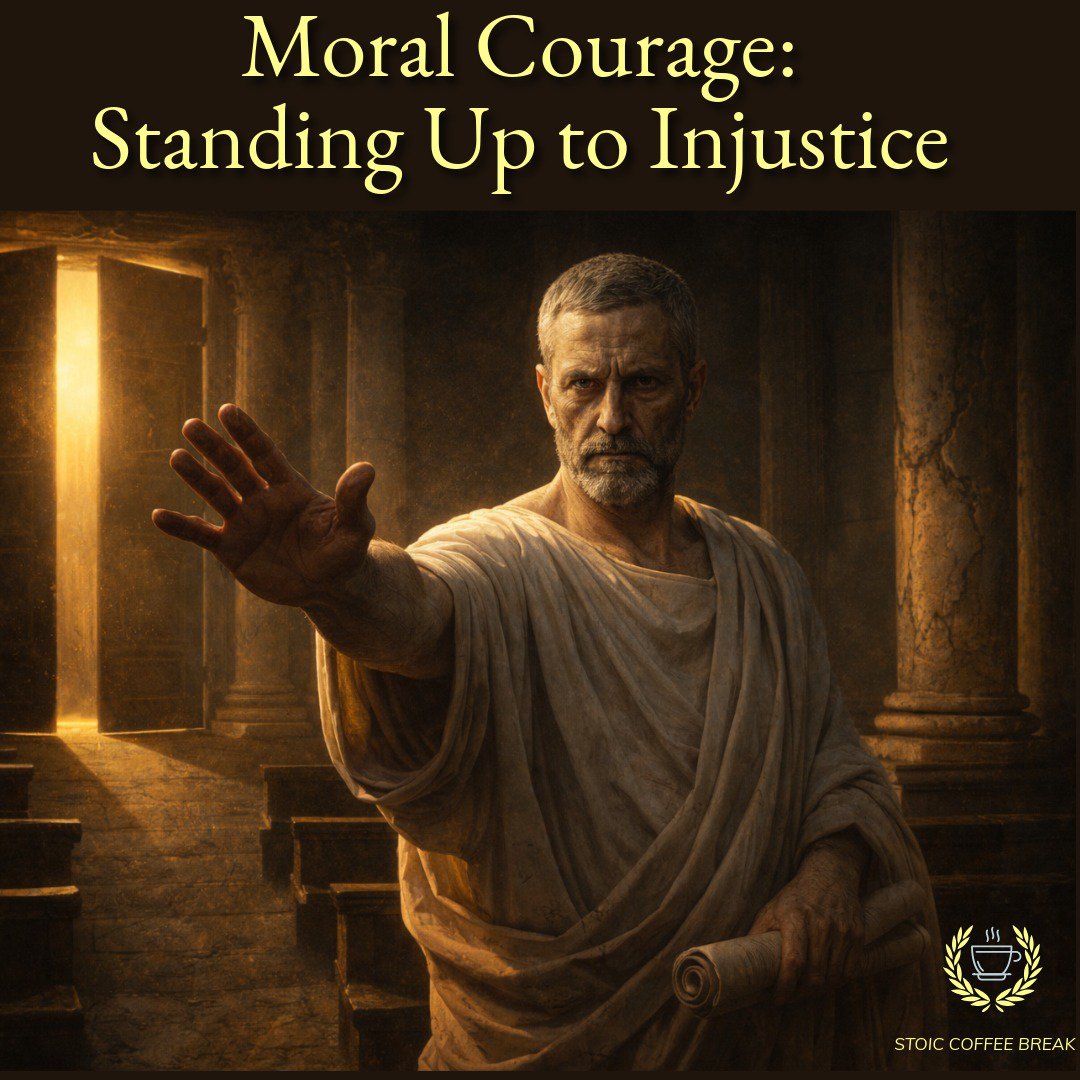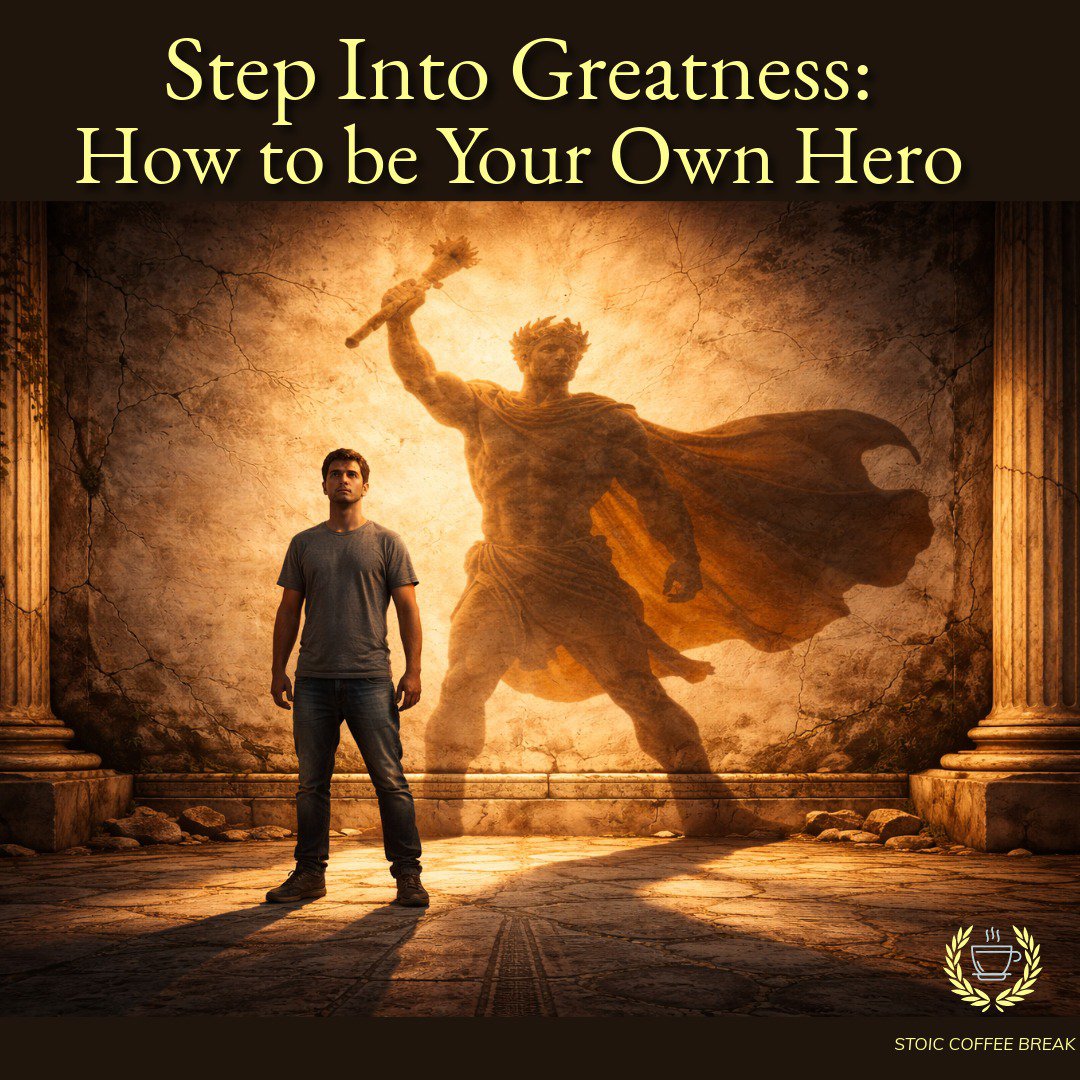
Do you ever think about your future self? How would your choices in the present change if you took the time to consider those choices would impact future you? Today I want to talk about the power of getting to know the future you.
“First say to yourself what you would be; and then do what you have to do.” — Epictetus
Let me ask you something. Have you ever made a decision that felt good in the moment… but your future self paid the price?
Maybe it was skipping the workout, a wild night out on the town, blowing your budget, staying silent when you should have spoken up, or saying something you wish you could take back. We’ve all been there. We tend to live as if our future selves are strangers—as if we can stuff our problems to the back of the closet, leaving them for an unfortunate roommate to deal with our mess.
But here’s the catch: you are that roommate. Future You is still you.
In today’s episode, we’re going to talk about how to build a relationship with your future self, how imagining who you want to become can help you make better decisions now, and how this concept lines up beautifully with Stoic philosophy. We’ll also explore how modern research backs this idea—and how you can start using it today to make choices that serve the best version of yourself.
Part 1: The Time Horizon Problem
One of the most common struggles in life is the battle between short-term pleasure and long-term well-being. This is what behavioral economists call temporal discounting—we tend to value rewards that we can have now far more than those we’ll get later. That’s why it’s easy to binge Netflix instead of working on a project, or to order junk food instead of taking the time to cook a meal.
The Stoics were deeply aware of this. Seneca wrote:
“It is not that we have a short time to live, but that we waste much of it.” — Seneca, On the Shortness of Life
We’re often so caught up in the immediacy of the moment that we forget how today’s decisions are paving the road for tomorrow’s reality.
And when you zoom out and see your life over months and years, a disturbing pattern often emerges: your past self may have been a bit of a jerk to your present self. And if you’re not careful, your present self might be doing the same thing to your future self.
So how do we make a shift so that Future You will thank Present You?
Part 2: Meet Future You
One of the most powerful exercises you can do is to get to know your future self. Not just in the abstract—actually take time to imagine them.
Visualize who you want to be in 1 year… 5 years… 10 years.
- What do they look like?
- How do they carry themselves?
- What habits have they mastered?
- How do they handle stress?
- What have they let go of?
- Who do they surround themselves with?
- What values do they live by?
When we give our future self an identity, a shape, a voice—it becomes harder to ignore them.
Psychologist Hal Hershfield at UCLA found that people who vividly imagine their future selves make significantly better long-term decisions. In one study, participants who interacted with an aged digital version of themselves were more likely to save for retirement. Why? Because the future self stopped being an abstraction—it became a person.
You don’t care about a hypothetical “someone.” You care about someone you know. So get to know future you.
One exercise I do with my coaching clients is when they set goals, I ask them, “Is that goal only focused on the material outcome, or will it help you become the kind of person you want to be?” Knowing your future self makes it easier to figure out what things are worth striving for and which things are worth letting go.
Part 3: Stoicism and the Future Self
Stoicism, despite its focus on the present and on accepting what we can’t control, also teaches us to live in alignment with our telos—our purpose, our ideal self.
Marcus Aurelius, in his Meditations, often reflects on what kind of person he wants to be: rational, calm, just, humble, and purposeful. He scolds himself when he drifts from that path—not because of guilt, but because he knows who he wants to become.
“Waste no more time arguing what a good man should be. Be one.” — Marcus Aurelius
This is essentially a dialogue with Future You. An inner standard to live up to. An internal compass.
Stoicism doesn’t ask us to dwell anxiously on the future—it asks us to prepare for it. To live today in a way that would earn the respect of our future selves.
Epictetus puts it this way:
“Now is the time to get serious about living your ideals. How long can you afford to put off who you really want to be? Your nobler self cannot wait any longer. Put your principles into practice – now. Stop the excuses and the procrastination. This is your life! […] Decide to be extraordinary and do what you need to do – now.” —Epictetus
That admonition has teeth. It’s a call to stop outsourcing our growth to a tomorrow that never comes.
Part 4: The Integrity Gap
Now let’s talk about what happens when your actions and your aspirations don’t align.
This is called the integrity gap—the distance between who you say you want to be and what you actually do. And that gap is where self-doubt, regret, and low self-esteem take root. Every time you act in a way that contradicts your future vision, you widen the gap. But every time you act in alignment with Future You—even in small ways—you close that gap, and confidence grows.
You don’t need to overhaul your life overnight. What matters is stacking enough small, aligned choices that your future self one day turns around and thanks you. If you want to be the kind of person who speaks clearly, practices kindness, handles stress gracefully, or creates meaningful work—start with one decision. Today.
One of the best things I’ve learned from Stoicism is this: the only moment you ever control is the present. But when you use that moment well, you shape everything that comes after.
Part 5: A Thought Experiment — “Letters from Future You”
Let’s try something together.
Imagine you get a letter from your future self—10 years older than you are now.
- What would they thank you for?
- What would they warn you about?
- What would they say you should stop worrying about?
- What would they beg you to start doing?
This is a surprisingly powerful exercise. It pulls you out of short-term thinking. It silences the petty worries and zooms in on what actually matters. Future You doesn’t care how many likes you got this week. Future You cares whether you started that thing you said you’d start. Whether you took care of your health. Whether you took that risk. Whether you were kind when it mattered.
And if you’re really brave, write a letter back to your future self. Make a commitment. Tell them what you’re going to do for them.
Part 6: What You Can Do Today
Let’s get practical. Here are three tools to bring this concept into your daily life:
1. The 10-10-10 Rule
When facing a decision, ask yourself:
- How will I feel about this in 10 minutes?
- How about in 10 months?
- How about in 10 years?
This helps snap you out of short-term thinking and re-align with long-term outcomes.
2. Future Self Journaling
Every morning, take 3 minutes to write from the perspective of your future self. Describe your life, your habits, your mindset. This primes your brain to seek alignment with that identity.
3. The Identity Filter
When deciding what to do, ask: “What would the person I want to become do right now?”
Not: “What feels easiest?”
Not: “What do I feel like doing?”
But: “What would future me do?” It’s a question that pulls you forward towards becoming the future version of yourself you want to be.
Part 7: The Catch — Compassion is Required
Here’s something important. If you’re anything like me, you might start thinking about all the ways your past self has let you down. All the poor decisions. All the wasted time.
But judgment doesn’t build character. Compassion does.
Your past self was doing the best they could with what they knew and felt at the time. Future You doesn’t need you to feel ashamed. Future You needs you to start. So forgive your past self. Make peace with where you are. And move forward.
Conclusion: Future You is Listening
I want to leave you with one last thought.
Every choice you make today is a vote for the person you will become. You are always becoming something. The only question is: are you becoming who you truly want to be?
Your future self is watching, quietly rooting for you. Not judging. Just hoping you’ll do something today that makes tomorrow easier. That you’ll be a little kinder, stronger, and braver.
And one day, if you do it right, you’ll wake up and realize—you are that future self. And you’ll be grateful that you started.
So take a breath. Zoom out. And ask yourself…. “What will Future Me thank me for today?”
My book Stoicism 101 is available! Order here!
Find out more at https://stoic.coffee
Watch episodes on YouTube!
Find me on linkedIn, instagram, twitter, or threads.
Thanks again for listening!


